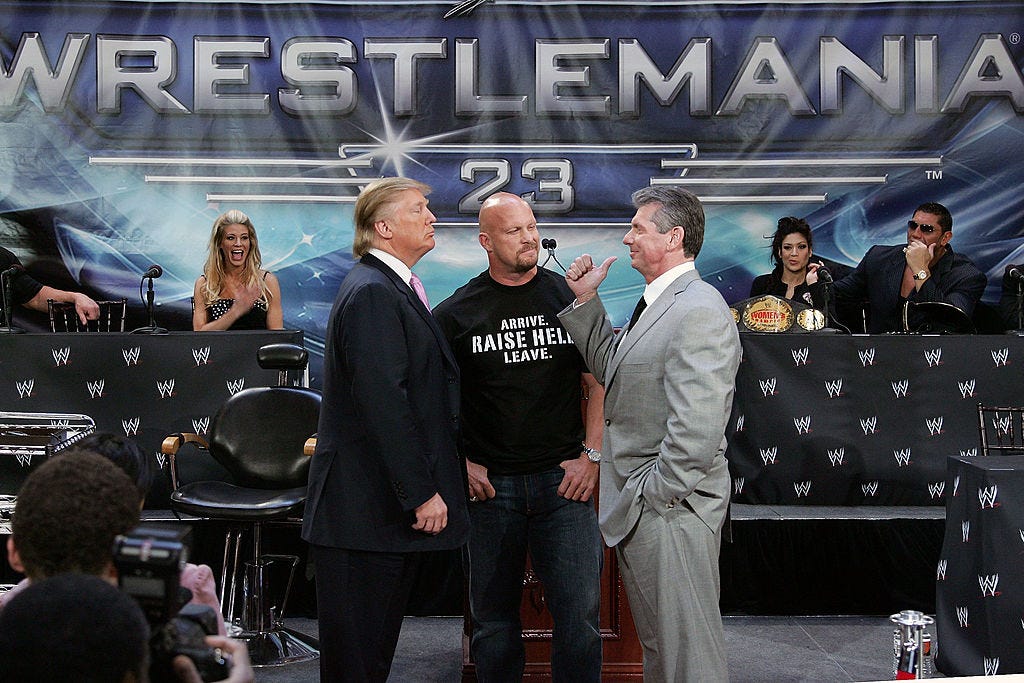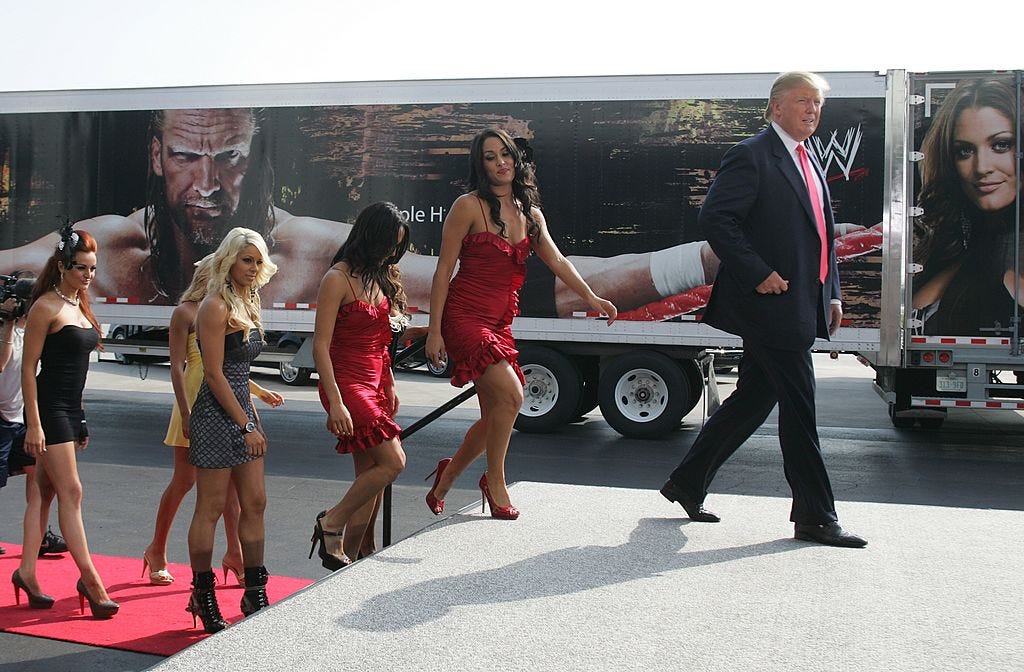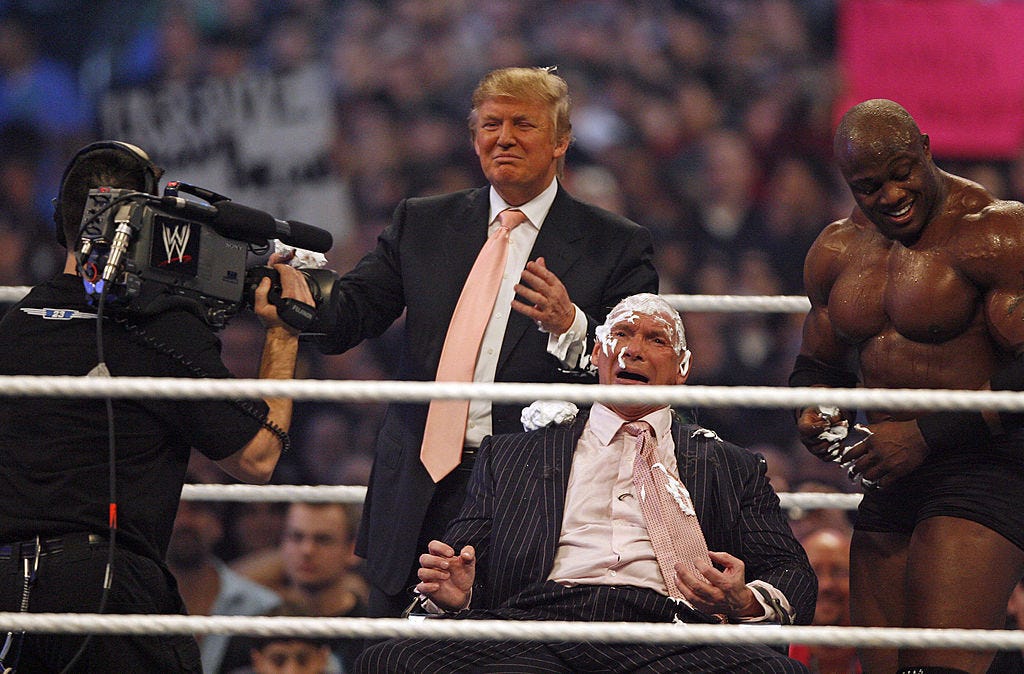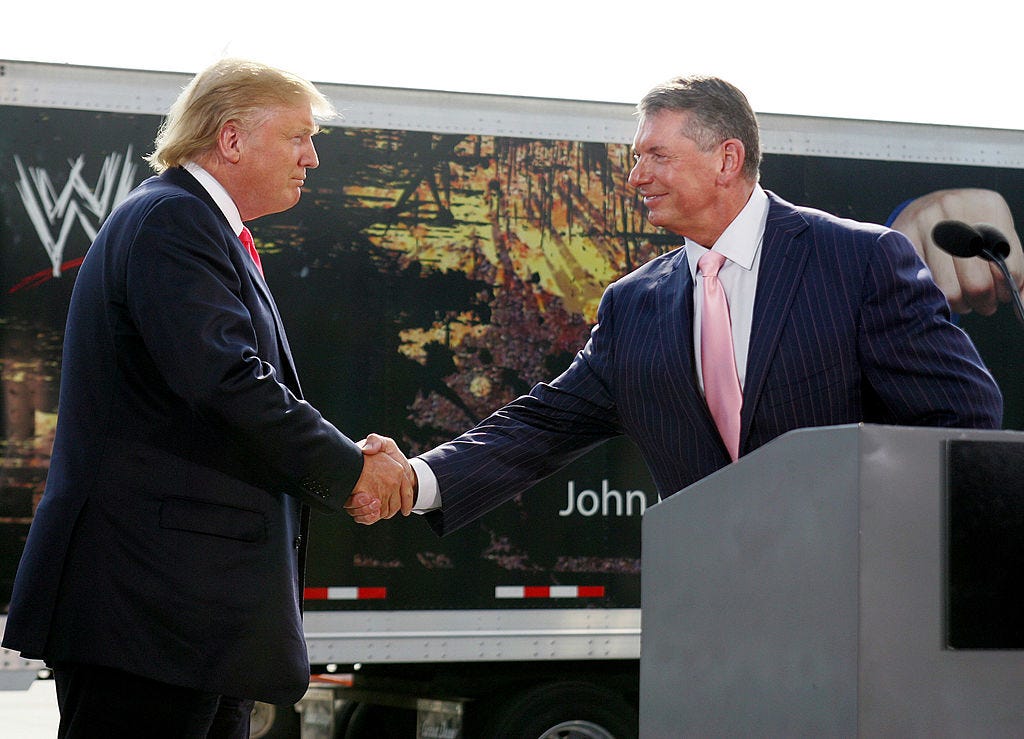The key to understanding Donald Trump's enduring appeal is Vince McMahon

Some people don't want to believe it, but it's true: Donald Trump has a reasonable chance of being elected the next president of the United States.
According to conventional political analysis, a presidential candidate charged with a single felony count would have little chance of winning a primary or general election. Presidential campaigns have been derailed for far less serious matters. Biden's 1988 presidential campaign came to a crashing halt when it was discovered he plagiarized sections of campaign speeches. Former Texas Governor Rick Perry (R) saw his 2012 campaign irreparably crippled when he was asked to name three federal agencies he would eliminate and could only name two. The campaign of former Vermont Governor Howard Dean (D) effectively ended because he screamed awkwardly during a campaign event in Iowa.
Trump has been criminally indicted four times and charged with 91 felonies, including "conspiracy to defraud the government" and "solicitation of violation of oath of a public officer." In May, a jury found Trump liable for sexually assaulting advice columnist E. Jean Carroll, awarding Carroll $5 million. And yet, these events do not appear to have had much of an impact on Trump's appeal.
Trump is dominating the Republican primary and running about even with Biden in an anticipated general election matchup. This is not simply a matter of Trump's hardcore supporters overlooking his legal troubles. National polling shows Trump attracting the support of about 44% of registered voters. That's far more voters than even identify as Republican. So, Trump is not only retaining the support of the Republican base but also millions of voters who identify as independent and moderate.
To better understand Trump's enduring appeal, Popular Information spoke with Abraham Josephine Riesman, author of Ringmaster: Vince McMahon and the Unmaking of America. Why talk to the biographer of a wrestling executive to understand Trump? McMahon is one of Trump's closest associates and, Riesman reports, one of the few people whose calls Trump takes in private. McMahon, who inducted Trump into the WWE Hall of Fame, could be serving as something of a role model to Trump right now. How many other people beat federal felony charges in court, weathered multiple sex scandals (so far), and emerged wealthier and more powerful?
Perhaps more importantly, McMahon is the creator of neo-kayfabe, the blending of fact and fiction — and good and evil — until it is all impossible to distinguish. McMahon himself became the most popular character on WWE shows, assuming the character of the arch-villain Mr. McMahon. There is now little distinction between McMahon and his WWE persona.
In her book, Riesman makes the case that Trump's political strategy is shaped directly and indirectly by McMahon. “For more than three decades, Trump has watched and admired Vince’s product," Riesman writes. "He has been both host and performer at many of Vince’s wrestling extravaganzas, honing his abilities as a rabble-rouser. Through Trump, Vince’s wrestling-infused mentality has reached the highest levels of the American system.”

Popular Information spoke to Riesman about what McMahon and WWE wrestling can teach us about Trump's continued popularity, Trump’s response to federal indictments, and whether Trump believes his lies about the 2020 election. The interview was edited for length and clarity.
On how some people on the left misunderstand Trump's appeal:
What we have with Trump is a guy who a lot of people on the left misunderstand as being just loved by the people who vote for him. And I think the feeling is not just, "Oh, Trump is good and strong and loves people and is a good Christian." Very often, people will approach Trump in the way that they approach what they call in wrestling a "tweener." Somebody who's not exactly good or not exactly evil, where they go, "Yeah, I don't approve of all of his methods or the things he says, but he's cool, and he gets the job done." I think thinking in terms of face [a "good guy" in wrestling] and heel [a "bad guy" in wrestling] for Trump is too binary, because it's too much in the old way of doing things. The old kayfabe, not the neo-kayfabe. Trump is not perceived just as a good guy or a bad guy.
On the wrestler who is most similar to Trump:
Stone Cold Steve Austin is the person who, more than anyone else, altered the way the wrestling public uses their protagonists. Because Steve Austin was billed as a heel. He was introduced as a bad guy. And they were pushing him hard as a bad guy. But the crowd was seeing all these evil acts and just eating them up. They were obsessed, and cheering for this horrible character who was doing awful things. And that's a real sea change for wrestling that, and then it ends up being a sea change for the culture.
On how WWE primed a generation for Trump:
You can't deny that millennial boys grew up watching Stone Cold Steve Austin, and then the Rock and Triple H, and all these other people in that mold. These are people who are not quite face, not quite heel, but beloved by the crowd, despite their evil acts. Millennial boys shaped their whole worldviews when they're 11 to 15 around that sense of morality. Not: Is it good, or is it evil? Just: Is it exciting? Is it cool? That's what the premium is placed on. And that's true now in politics, too. Maybe it's always been true in politics to a certain extent. But right now, the thing that grabs people to vote is very often just: Do I find this person entertaining, recognizable, iconic, or funny? As opposed to: Will this person do a good job in the elected office that I'm voting for them for? And wrestling turned that into a science.
On how Trump, like McMahon, is popular because of — not in spite of — his transgressions:
Trump is very good at pressing buttons, as Vince is. They're very good at finding the parts of your brain that make you the most riled up and just mashing that button, just making you as amped up, or angry, or both, as you can be. He throws out these transgressive pieces of red meat. And if you're on his team, that's very exciting for you, if you're not on his team, it's also very exciting for you, but in a negative way. The point is, you're excited, and you're paying attention to him. And that's a great strategy for him. And people really enjoy it. Like they don't want to admit it, and it's not a good thing that they enjoy it. But the human brain is what it is, and it likes when people break the rules. Even if you wouldn't break the rule, there's something titillating about seeing somebody who has no regard for the rules. All of these [WWE] characters are so ludicrously transgressive, and that appeals to people. And that transgression can come in the form of saying something horrifying that you don't agree with as a viewer, or it can come in the form of that same character saying something totally true that you do agree with, but you can't believe was said in public.
On how Trump fans, like modern wrestling fans, understand that most things Trump says aren't real:
This ecosystem allows people to do horrible things and still succeed, even among people who are offended by the things that are being done and said. Because you operate from the assumption that everything you're seeing in the ring is fake, or at least most of it. And that's dangerous, because once you're assuming everything's fake, except for the things you want to believe are true, then you're just having a grab bag, personalized reality. So you can go, if you're a Trump voter, "Trump means it when he says [X], but he doesn't mean it when he says [Y]." And once you start just picking and choosing what you think reality is from a grab bag of truth and lies that you can't distinguish between, then you're in real trouble as a society. Every individual person is just picking their own hodgepodge reality.
The neo-kayfabe mindset is, "take it seriously, but not literally." Take the excitement as something that is a force to be reckoned with, but don't actually believe any of the content. That's wrestling. You're gonna have a thrill, but don't actually believe anything that's happening, except for the whispered part, which is, except believe the parts that you want to believe, those parts are true. And then people can just completely lose their minds.
On whether Trump believes his own lies about the 2020 election:
The biggest thing I want people to take away from the book is that it does not matter. What is in his heart and what he believes is much less important than what he does and what the material effects of those things are. And when it comes to Trump, you can lose many years of your life trying to figure out what's going on inside that head, inside his skull, inside his brain. But the ultimate big question is what is to be done about the material harm being caused, as opposed to this academic parlor chatter about does he really believe the election was stolen? Or is he making it up? The reason that that's not a relevant question is not only because there are more important things, but also because I don't think that's a distinction that exists for Trump
On how Vince McMahon might advise Trump to respond to criminal charges:
The best strategy that Vince ever comes up with in any given situation is to mess with the heads of the public. Mess what their minds. This is what Trump is best at, and Vince is even better at. It's messing with reality, acting ostentatiously, and saying things you're not supposed to say to such a degree, that, ultimately, the masses are just sort of baffled, and paying attention to you. This is something that I try to get at in the book is, when you have a viewer, or a reader, a surfer of the web, whatever, who is baffled about whether the thing they're looking at is real or not, or where the boundaries of reality and fiction are, that they start paying really close attention to what they're looking at, because they're so confused. I think Vince's advice generally would be so ridiculous or be so real, or both, that people are confused enough about the news that they disengage and go, "I don't care."
You can buy Riesman's book, Ringmaster: Vince McMahon and the Unmaking of America, from an independent bookseller here.




Some years ago, the leader of the band I was in at the time, one of our vocalists and myself had interviewed an accountant at my suggestiuon, in order to make sure we had our taxes squared away.
I walked away from the ingterview mightily impressed but the band leader didn't like him. When asked why at the subsequent band meeting, he replied "he has no personality." To which I replied, "we want an accountant, not a entertainer!!!" and the meeting collapsed into laughter.
That sort of mindset is more dangerous than funny nowadays. Too many folken wish to be entertained by those we choose to govern, consequences be damned!
Trump represents the “ugly American” and man oh man there are too many of them.